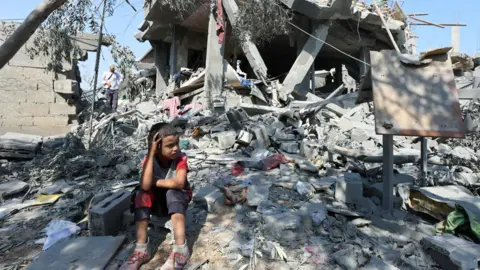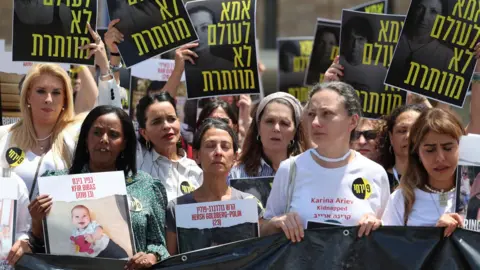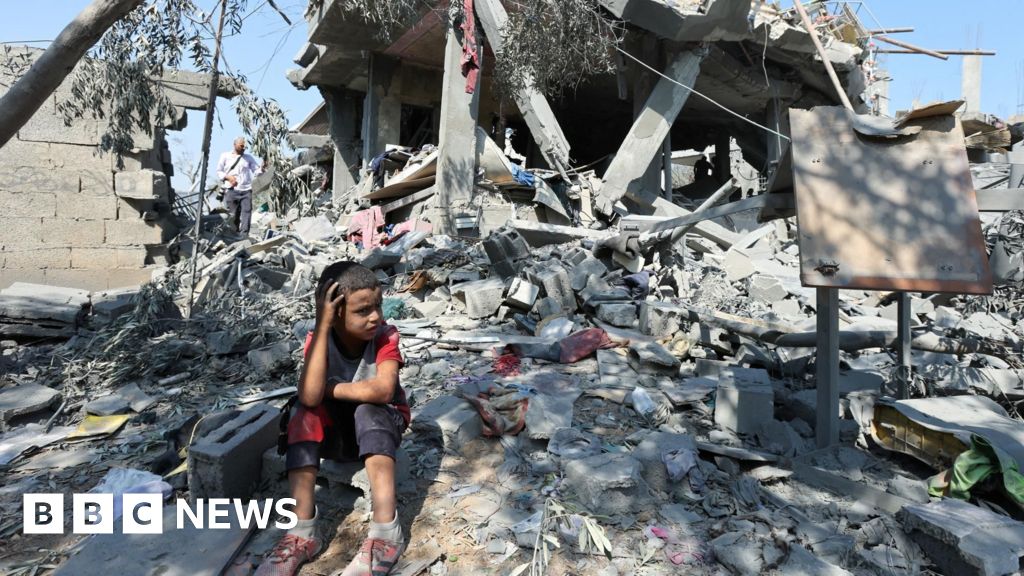By David Gritten & Rushdi Abualouf, BBC News, London & Istanbul
 Reuters
ReutersHamas has warned that Israel’s latest military operations in Gaza and non-negotiable positions of Israel’s prime minister could set ceasefire and hostage release talks “back to square one”.
Hopes of a breakthrough rose last week when the Palestinian armed group dropped a demand for Israel to accept a permanent ceasefire as a precondition.
But Hamas said Benjamin Netanyahu had created new “obstacles” ahead of the resumption of indirect talks in Qatar on Wednesday by setting out principles for any deal that included allowing Israel to resume the fighting.
There was no immediate Israeli response, while the US and a senior Palestinian official downplayed the significance of the public comments by both sides.
It came as Israeli tanks and troops reportedly pushed deeper into several central areas of Gaza City, sending thousands of Palestinian residents fleeing.
The Israeli military announced that its forces had killed “dozens of terrorists” in the operation, which it launched on Monday in response to what it said was intelligence indicating Hamas and Palestinian Islamic Jihad infrastructure there.
It also said six underground tunnels about 6km (3.7 miles) long had been found and destroyed in Gaza City’s eastern Shejaiya district, where a similar operation began more than a week ago.
Palestinian health officials meanwhile reported that Israeli air strikes had killed at least 18 people across Gaza on Tuesday, including six in Gaza City.
The Israeli military launched a campaign in Gaza to destroy Hamas in response to an unprecedented attack on southern Israel on 7 October, during which about 1,200 people were killed and 251 others were taken hostage.
More than 38,240 people have been killed in Gaza since then, including 50 in the past day, according to the territory’s Hamas-run health ministry.
 EPA
EPAOn Monday evening, Hamas put out a statement saying its Doha-based political leader Ismail Haniyeh had made “urgent contacts” with Egyptian and Qatari mediators over what it called continued “massacres, killing and displacement” of Palestinians by Israeli forces.
“Haniyeh warned of the disastrous repercussions of what is happening in Gaza City, Rafah and other areas across the Gaza Strip, noting that this could bring the negotiating process back to square one,” it added.
Another Hamas statement accused the Israeli prime minister of “placing additional obstacles in the way of the negotiations”.
Last Thursday Mr Netanyahu told Israel’s negotiators to resume work after Hamas dropped its demand for a permanent ceasefire at the outset of a proposed deal outlined by US President Joe Biden at the end of May.
But expectations were dampened on Sunday by a statement from the prime minister’s office which insisted that four principles had to be part of any agreement.
One was that Israel could “resume fighting until all of objectives of the war have been achieved” – something Hamas has previously rejected. The others were that there would be no weapons smuggling into Gaza from Egypt, that armed fighters would not be allowed to return to northern Gaza, and that Israel would maximize the number of living hostages released.
A deal agreed in November saw Hamas release 105 of the hostages in return for a week-long ceasefire and some 240 Palestinian prisoners in Israeli jails. Israel says 116 hostages are still being held, 41 of whom are presumed dead.
Mr Biden said the proposed new deal involved three phases.
The first would include a “full and complete ceasefire” lasting six weeks, the withdrawal of Israeli forces from populated areas of Gaza, and the exchange of some of the hostages – including women, the elderly and the sick or wounded – for Palestinian prisoners held in Israel.
The second phase would involve the release of all other living hostages and a “permanent end to hostilities”. The third phase would see the start of a major reconstruction plan for Gaza and the return of dead hostages’ remains.
 Reuters
ReutersWhite House national security spokesperson John Kirby acknowledged that there were still “some gaps” between Israel and Hamas’s positions.
But he stressed that CIA director William Burns and US Middle East envoy Brett McGurk would not have flown to Cairo for talks with their Egyptian, Israeli and Jordanian counterparts on Monday if they did not think those gaps could be closed.
“On both sides, you see public comments that aren’t necessarily fully reflective of the conversations that we’re having privately with them or their interlocutors,” he told reporters.
Hamas’s statements were also viewed with scepticism by a senior Palestinian official familiar with the negotiations.
The official told the BBC that the recent progress would not have been possible had Hamas not relented on its demand for a permanent ceasefire, and that the group’s comments reflected frustration at the recent Israeli military operations in Gaza City seemingly designed to exert pressure on it to make further concessions.
He also said a sense of cautious optimism was prevailing ahead of the CIA director’s arrival in Doha to kickstart a fresh round of talks.
Mr Burns is expected to hold discussions on Wednesday with Qatar’s Prime Minister and Foreign Minister, Sheikh Mohammed bin Abdul Rahman Al Thani. Egyptian intelligence chief Abbas Kabel and the head of Israel’s Shin Bet security service, Ronen Bar, will join them later.
The Palestinian official said the talks would be challenging, arduous and likely protracted.
Hamas is said to want Israeli forces to withdraw from key areas of Gaza, including the Rafah border crossing with Egypt and the Philadelphi corridor, a strip of land running along the Egyptian border.
There is also a stand-off over Hamas’s demand for the release from Israeli prisons of 100 senior figures from the Palestinian Islamic Jihad and Fatah political factions.


